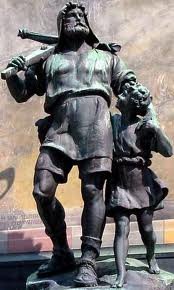Wilhelm Tell: Difference between revisions
m (1 revision) |
No edit summary |
||
| (3 intermediate revisions by the same user not shown) | |||
| Line 1: | Line 1: | ||
====Date: [[:Category: | ====Date: [[:Category:1804|1804]] [[:Category:1941|1941]] [[:Category:1989|1989]]==== | ||
====Region: [[:Category:Europe|Europe]]==== | |||
====Subject: [[:Category:Political/Economic/Social Opinion|Political/Economic/Social Opinion]]==== | |||
====Medium: [[:Category:Theatre|Theatre]]==== | |||
====Medium: [[:Category:Theatre|Theatre | |||
---- | ---- | ||
[[File:Tell1.jpg|right]] | |||
'''Artist:''' Friedrich von Schiller (1759 - 1805) | |||
'''Confronting Bodies:''' Various German political leaders for the past 200 years | |||
'''Confronting Bodies:''' Various political leaders | |||
'''Dates of Action:''' 1804, 1941, 1989 | |||
'''Location:''' Germany | '''Location:''' Germany | ||
'''Description of Artwork:''' ''Wilhelm Tell'' is a play about the legend of Wilhelm Tell, an expert marksman who eventually kills a tyrannical emperor for treating him unjustly. <P> | |||
'''Description of Artwork:''' | |||
'''The Incident:''' While there is no one specific incident of the play's banning that stands out, it has been cut and pulled many times for bringing up the issue of tyrannicide. Even in the play's first performance, the entire fifth act needed to be cut because the tsar's daughter was in the audience and could not witness an emperors assassination. The King of Prussia had the play banned because the hero was "unsympathetic." The Nazis later praised the play as a symbol of German national identity, but had it banned in 1941, when Hitler became more paranoid. <P> | '''The Incident:''' While there is no one specific incident of the play's banning that stands out, it has been cut and pulled many times for bringing up the issue of tyrannicide. Even in the play's first performance, the entire fifth act needed to be cut because the tsar's daughter was in the audience and could not witness an emperors assassination. The King of Prussia had the play banned because the hero was "unsympathetic." The Nazis later praised the play as a symbol of German national identity, but had it banned in 1941, when Hitler became more paranoid. <P> | ||
'''Results of Incident:''' The play continued to be banned by politicians or governments that found it dangerous. In 1989 it was banned in East Germany, but was reinstated when the regime fell. <P> | |||
'''Source:''' Censorship: A World Encyclopedia. Ed. Derek Jones. Chicago; London: Fitzroy Dearborn, 2001. | |||
[[Category:1804]] | |||
[[Category:1941]] | |||
[[Category:1989]] | |||
[[Category:1800s]] | |||
[[Category:1940s]] | |||
[[Category: | [[Category:1980s]] | ||
[[Category:]] | [[Category:19th century]] | ||
[[Category:]] | [[Category:20th century]] | ||
[[Category:Europe]] | [[Category:Europe]] | ||
[[Category:Political/Economic/Social Opinion]] | [[Category:Political/Economic/Social Opinion]] | ||
[[Category:Theatre]] | [[Category:Theatre]] | ||
[[Category:Friedrich von Schiller]] | [[Category:Friedrich von Schiller]] | ||
{{DISPLAYTITLE:<span style="font-style: italic;">Wilhelm Tell</span>}} | |||
__NOTOC__ | __NOTOC__ | ||
Latest revision as of 22:03, 15 February 2012
Date: 1804 1941 1989
Region: Europe
Subject: Political/Economic/Social Opinion
Medium: Theatre
Artist: Friedrich von Schiller (1759 - 1805)
Confronting Bodies: Various German political leaders for the past 200 years
Dates of Action: 1804, 1941, 1989
Location: Germany
Description of Artwork: Wilhelm Tell is a play about the legend of Wilhelm Tell, an expert marksman who eventually kills a tyrannical emperor for treating him unjustly.
The Incident: While there is no one specific incident of the play's banning that stands out, it has been cut and pulled many times for bringing up the issue of tyrannicide. Even in the play's first performance, the entire fifth act needed to be cut because the tsar's daughter was in the audience and could not witness an emperors assassination. The King of Prussia had the play banned because the hero was "unsympathetic." The Nazis later praised the play as a symbol of German national identity, but had it banned in 1941, when Hitler became more paranoid.
Results of Incident: The play continued to be banned by politicians or governments that found it dangerous. In 1989 it was banned in East Germany, but was reinstated when the regime fell.
Source: Censorship: A World Encyclopedia. Ed. Derek Jones. Chicago; London: Fitzroy Dearborn, 2001.
